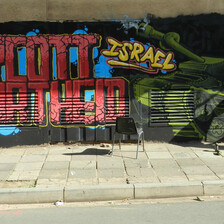The Electronic Intifada South Africa 5 December 2011

Mbuyiseni Ndlozi
Among those following the tribunal’s deliberations was a group of young South Africans, including Mbuyiseni Ndlozi of BDS South Africa, a group campaign for boycott, divestment and sanctions against Israel, and Joni Barnard of Artists Against Apartheid. While travelling by train from Johannesburg to Cape Town, these activists recorded a short video, titled “Shout Out to the Russell Tribunal on Palestine: Live from the Shosholoza Meyl.”
Mbuyiseni states in the video: “I can confidently say that the verdict is that Israel is guilty of apartheid.”
The Electronic Intifada contributor Adri Nieuwhof interviewed Mbuyiseni in Cape Town about the boycott, divestment and sanctions (BDS) movement against Israeli apartheid and how it connects with South Africa’s struggle.
Adri Nieuwhof: Can you please introduce yourself?
Mbuyiseni Ndlozi: I am a PhD student at Wits University in Johannesburg. I am a member of the South African Students Congress (SASCO). I am attending the Russell Tribunal on Palestine in Cape Town with the delegation of BDS South Africa. I study political sociology, looking at youth politics in post-apartheid South Africa.
AN: What type of Palestine solidarity activities do you participate in?
MN: The Progressive Youth Alliance — consisting of the ANC Youth League, SASCO and the Young Communists — held joint activities with the Palestine Solidarity Committee in Johannesburg. For example, in the recent visit by Israeli Lieutenant Colonel David Benjamin to the Limmud conference in South Africa, we went to demonstrate against his coming. He had been part of the bombings in the war on Gaza in 2008-09. We protested that the university hosted someone who is a war criminal.
And in the boycott of an Israeli propaganda speaking tour to South African universities, we responded to a call from Palestinian students. The majority of the Israeli delegation had been involved in the military. It was mentioned in their profiles on the website. They came to our universities to fix the image of Israel. We waited for them at the airport. They are not welcome because their agenda was not welcome. They represent a regime constructed solely on racial hatred. They did not come proudly.
AN: How did you become involved in Palestine solidarity activism?
MN: I have been at Wits university since 2004. The Palestine Solidarity Committee (PSC) at Wits was formed in 2005 and had campaigns on our campus. They held weekly meetings where we discussed Palestine, where they screened videos. As a young South African, I understand the key beneficiaries of international solidarity. The solidarity that we received [under apartheid] was based on the same type of challenges. We went through apartheid. I learned at the Russell Tribunal that it is worse for Palestinians.
In the Palestinian struggle lies a powerful similarity. I was born in 1985; I became conscious at a young age. This is familiar in situations of conflict. I have sharp memories of 1991, when I was at school in first grade. Some of my own relatives were involved in political activities. I understood from the narrative in our family the horror of apartheid.
Palestine has a strong a way of reminding me of the past. When I hear the narrative, it literally involves remembering in the most powerful way. It casts light on our own history. It has renewed my sense of commitment, rejuvenated my relation to my own country. Things in 2011 are literally like the end of the 1980s. Some are disappointed that things have not gone right. It [helps] me to make my country better. Motivation is not happening overnight — I think more seriously now about my own justice. As COSATU [the Congress of South African Trade Unions] Secretary General [Zwelinzima] Vavi said at the tribunal, “the South African working class will not be free until the Palestinian working class has been liberated as well.”
AN: How do you assess the BDS movement in South Africa?
MN: I think that the solidarity work in South Africa has not taken the shape it deserves. I suspect it is because of the nature of apartheid, the ways it sought to isolate the black community from the world. The solidarity South Africans received was felt by the ruling white minority, black exiles, the top of the people. It did not infiltrate the streets.
Part of the ways to remember the international solidarity we received, is to get involved in Palestine solidarity work. There is a great deal of political development we can get from being active on Palestine for our own political development. It can revive a sense of political commitment, engagement in the service of our own people. Palestine solidarity has the potential, because of the similarities, to inspire us to deal with our past. The solidarity work may reinvigorate our commitment to justice, casting this light in ways that possibly very little in the country can.
South Africa is very important. We should be in the forefront. As BDS South Africa we want to be there. We want the country to lead the boycott of Israel. We want sanctions against Israel. We want South Africa to break relations with Israeli institutions based on values of human rights and democracy. We need to mobilize the youth. There is a strong Zionist lobby in South Africa, which is arrogant and has been comfortable for some time. The BDS movement will be successful when it will no longer be fashionable to be a Zionist.
Adri Nieuwhof is a consultant and human rights advocate based in Switzerland.




